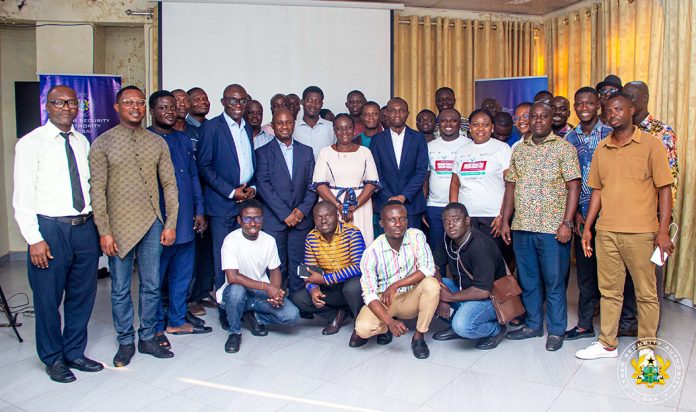The Director-General of Cyber Security Authority, Dr Albert Antwi-Bosiako, has disclosed that a total of 24 million Ghanaians are hooked up to the internet as of January 2024.
In a speech read on his behalf at the National Cyber Security Forum with the Ashanti regional chapter of the Ghana Journalists Association in Kumasi recently, he said 7.60 million Ghanaians have also subscribed to social media, making the West African nation the 15th globally, in daily time spent on social media.
At the forum, which was under the theme: ‘National Cybersecurity Awareness Month, Combating Misinformation and Disinformation in a Digitally Resilient Democracy: Our Collective Responsibility’, the media personnel were educated on a number of cybersecurity issues including publishing, switching, strong password, threats of misinformation and bots among others.
Giving details about the cybersecurity situation in the country, Dr Albert Antwi-Bosiako said “as of January 2024, about 24.06 million Ghanaians were connected to the internet, with 7.60 million actively using social media.
“Ghana currently ranks 15th globally in daily time spent on social media and while these advancements offer immense opportunities, they also introduce inherent risks.”
Though Ghana is making strides in internet penetration among others, it has its own side effect, especially vulnerabilities that cybercriminals can exploit.
“The fast expansion of internet usage has led to increased exposure to risks and new avenues for criminal activities. In this context, misinformation and disinformation have emerged as critical threats”, he said.
Painting a gloomy picture about the impact of misinformation on democracy, he noted that the former could wipe away credibility of institutions and thereby take Ghana’s democracy backwards.
“Misinformation can undermine trust in institutions, disrupt communities and erode the very fabric of our democracy”, he added.
Rooting his argument in a study conducted by University of Oxford, in 2024, he revealed that social media platforms were used to spread misinformation and disinformation in 81 countries, with 70% of online misinformation being spread through just 10% of social media accounts.
According to Dr Albert Antwi-Bosiako, a 2021 report by the Media Foundation for West Africa (MFWA) also highlighted that social media was a major source of misinformation and disinformation in Ghana, indicating the need for robust measures to mitigate the menace of Mis/Disinformation in Ghana’s digital space.
“The fight against misinformation and the promotion of cybersecurity is a shared endeavour. Together, as journalists, cyber experts and concerned citizens, we can build a digitally resilient democracy that prioritises truth, safety and collective well-being.
“Your role as journalists is vital in this fight. You are the guardians of truth, the champions of integrity and your commitment to ethical journalism is indispensable in combating misinformation and disinformation,” he said.
The partnership between the CSA and the GJA, according to him, was a testament to a shared commitment to fostering a safer cyber environment.
“Together, we can empower individuals and organisations to recognise the importance of cybersecurity and the role they play in it”, he said.
“Misinformation, false or misleading information shared without malicious intent, and Disinformation, deliberately falsified information intended to deceive, both pose substantial risks to democratic processes and societal stability”, he added.
Ahead of the December polls, Dr Antwi-Bosiako noted that it was essential for all stakeholders to actively work towards safeguarding the integrity of Ghana’s information ecosystems.
In his welcome address, the General Secretary of GJA, Mr. Edmund Kofi Yeboah, expressed appreciation to CSA for the event. According to Kofi Yeboah, misinformation and disinformation are challenges confronting the media landscape.
He urged the media to live above reproach as Ghana gears for general elections in December, emphasising that Ghana’s stride in democracy largely hinges on the Ghanaian media.
In view of this, he charged the media to be circumspect in the discharge of their duties.








